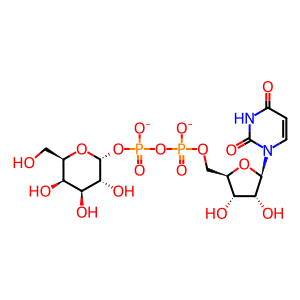Reaction: Defective GALE does not epimerise UDP-Gal to UDP-Glc
- in pathway: Defective GALE causes EDG
Cytosolic UDP galactose 4 epimerase (GALE) catalyses the interconversion of UDP-D-galactose (UDP-Gal) and UDP-D-glucose (UDP-Glc), the third reacton in the Leloir pathway of galactose metabolism. GALE can also catalyse the epimerisation of UDP-N-acetylglucosamine to UDP-N-acetylgalactosamine. The active form of the enzyme is a homodimer with one molecule of bound NAD+ per monomer (GALE:NAD+ dimer). Defects in GALE can cause Epimerase deficiency galactosemia (EDG; MIM:230350), or type III galactosemia (diseases of galactose metabolism) whose clinical features include early onset cataracts, liver damage, deafness and mental retardation. The disease is now considered to be a continuum from mild to severe phenotypes (Openo et al. 2006). A mutation causing the severe form of EDG is V94M (Wohlers et al. 1999). Protein misfolding is the underlying cause of the disease and this leads to loss of enzymatic activity and, in some cases, reduced affinity for the NAD+ cofactor (McCorvie et al. 2012).
Reaction - small molecule participants:
UDP-Gal [cytosol]
Reactome.org reaction link: R-HSA-5610036
======
Reaction input - small molecules:
UDP-alpha-D-galactose(2-)
Reaction output - small molecules:
Reactome.org link: R-HSA-5610036

